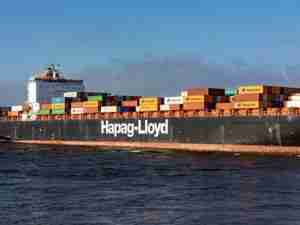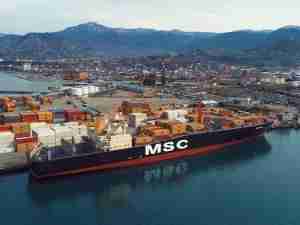Free markets aren’t free; someone pays the price
By: Megan McArdle | Mar 24 2016 at 09:10 AM | Liner Shipping
Are you fed up with the “free market uber alles” types in the Republican Party, or for that matter, the “free market plus redistribution” types among the Democrats? This year there’s an alternative.
For the first time in decades, we have candidates in both parties running strongly against markets and trade—on the Republican side, practically galloping. They may put different names to what they’re against: neoliberalism, the “Washington Consensus,” “laissez faire,” “donor class politics.” The name doesn’t matter, because whatever you call it, they’re agin it.
For decades, the leading parties of the leading nations have moved toward freeing the movement of goods, capital and people across borders—deregulating and privatizing industry and rationalizing government operations. American voters quietly let both parties pursue those goals. No longer.
I share some of their irritations. Both parties are excessively obsessed with the concerns of a relatively small class of hyper-educated donors and staffers, with the vast mass of voters promised whatever crumbs happen to fall from the well-set tables of the professional class. This is not just bad policy; it’s criminally stupid politics.
I share some of voters’ problems with the way that the establishment has handled issues like trade, and yet I accept we are not going to abruptly roll those decisions back. Nor should we.
On both sides of the political spectrum, you can now read people speculating that they are finally on the brink of throwing off the cruel yoke of the establishment types who make economic policy for their parties. On the conservative side, in particular, there are people talking as if donors and affluent suburban voters were some sort of vestigial appendage that the party would be better off without.
Yet if you get rid of them—well, let’s not even talk about where you would get the replacement money to run campaigns. Let’s talk about where you would get the voters. You don’t want your establishment voters anymore. You’re equally fed up with the other party’s establishment voters. So … which interest group are you going to poach from the other party? It’s not enough to talk about the sort of issues you’d like your party to support, unless that’s all you’re interested in doing—talking. (And listening to some Trump supporters, I get the sense that for them, the trash talking rather is the main appeal.)
But most of us don’t want a party that just talks a good game while losing every play; most people want a party that will actually win. Which means putting together a large enough team to hold the field (i.e., one that comprises roughly half the electorate). To do that, you need a playbook full of issues that will unite your proposed coalition, without disgusting any of them enough that they head for the sidelines—or worse, the other side. .
People on both sides are starting to believe that they do have the core of a new playbook: “less free market, more … something else.”
Unfortunately, it’s not enough to express a vague wish for something else and then lean back and wait for politicians to deliver it. That something else has to be politically palatable and practically feasible. Protectionism clearly passes the first test among some segment of the electorate. But it’s not clear whether that segment is big enough to win an election. And it’s fairly clear that on the second test, it simply flunks.
I get why you might long for something else. I’ve already confessed that I, like many free traders, underestimated the effect of China’s 2001 accession to the World Trade Organization, which gave it broad access to global markets. The sudden addition of several hundred million low-wage workers to the world labor market has been a catastrophic event for parts of the U.S. economy that suddenly had to compete. The protectionists were right that free trade was causing problems, and we were wrong.
But that doesn’t mean I’m ready to embrace protectionism. For one thing, China really was unique; there’s no other country that’s going to suddenly add so many workers to the market. For another, there is no plausible “undo” button. Oh, we can certainly slap tariffs on Chinese goods, but then China will take the dispute to the WTO, where we will lose. Of course, we could pull out of the WTO entirely, but this would do incalculable damage to both our supply chains and our exports to other countries. Yet even this most drastic of steps would not roll us back to 2000, because China would still be competing with our exports to other countries, and there’s little we can do to stop it. There are no easy unilateral decisions in a multilateral world
But say you think that trade takes more out of us than we take out of trade, and you’re willing to move our whole economy back behind tariff walls. Flat-panel televisions may become more expensive, you might argue, but the resulting economy will be so much fairer and more rewarding that we’ll hardly miss watching the Super Bowl on 70 inches of gleaming glass.
The problem is that you’re not exactly the first person to come up with this idea. Every decade has brought new leaders promising that they’d found a new way to beat the market through protectionism, industrial policy, welfare spending, economic management. Every decade has also brought us the spectacle of these projects ending in disaster as the rigidities and distortions introduced by the controls cause the system to break down spectacularly under some stress. China itself currently seems to be undergoing just such a crisis.
People have the illusion that these things work because you can get away with that stuff temporarily, if other conditions are favorable. Venezuela seemed to be doing great—as long as oil prices stayed high. The Big Three made a pretty good car in the 1950s, even though they were effectively an oligopoly shielded from foreign competition. But by the 1970s … well, there’s a reason few people fantasize about owning a mint-quality 1977 Chrysler Cordoba.
Keeping goods and capital out is hard. When governments succeed, it’s a mess. Shielded from competition, the protected sectors tend to become backward and indifferent to their customers. Think of the local cable monopoly and how terrible it is at everything, and much it charged for terrible service. Now imagine if all goods and services were provided by similar organizations.
It’s not just the harm to domestic consumers, however. Naturally, manufacturers in highly protectionist countries can forget about exporting their (low-quality, high-cost) goods. Some insiders benefit from sweetheart business deals, or jobs that pay wages above what they’d command in a free global market—but because keeping those deals in place requires controls that rob the economy of its dynamism, if they lose that deal, or that job, they have a very hard time replacing it, and join the growing ranks of the have-nots. Meanwhile, the protectionist controls create lots of opportunity for cronyism and corruption.
Does market liberalism create some outcomes that many, even most, people won’t like? Yes. But the defense of market liberalism is not that it is perfect, only that it is less imperfect than any of the alternatives we can see.
The problem is that growing numbers of people are experiencing the imperfections of free markets right now. The industries that supported their parents have disappeared. They see no path to the financial security that Americans once felt. So what if the market liberals are perfectly correct? So what if this impersonal system of specialization and exchange has produced the greatest flowering of prosperity, health and opportunity in human history? That’s small comfort to those Americans who are not feeling prosperous or healthy. That’s small comfort to the Americans who have lost opportunities while others have gained them.
No one likes to be told that they are at the mercy of impersonal forces, however ultimately benign. The populists proposing protectionism may not be able to offer prosperity, but they can offer the illusion of control. In times of great uncertainty, that’s an easy sell.
On the other side, the people trying to sell the benefits of the free market face a real hurdle. And not just because they are the people who benefit the most from that system. In a future column, I’ll talk about why the death grip of the educated elites on the policy priorities of both parties has become such a big problem—for them, for American workers, and for the entire political system.









